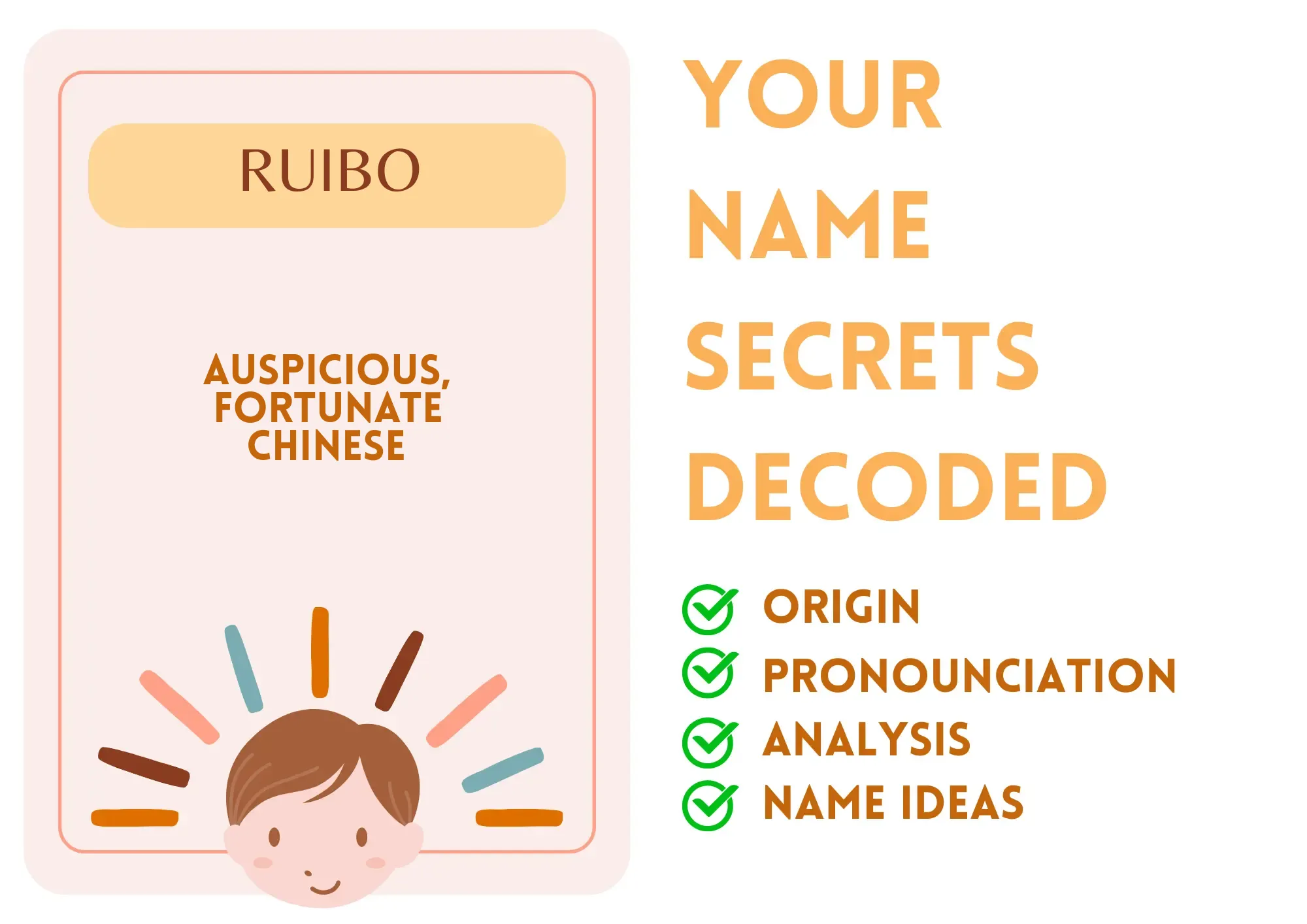
Ruibo
Ruibo is a distinctive and culturally rich name of Chinese origin, which translates to 'auspicious' or 'fortunate.' It is commonly used as a masculine name, reflecting a positive and hopeful connotation. The name holds significance within Chinese culture, often associated with good luck and auspicious beginnings, making it a favored choice among parents.
The perception of the name Ruibo is generally positive, evoking thoughts of fortune, happiness, and prosperity. Its unique sound and positive meaning make it appealing. It is relatively easy to write and pronounce, and its simplicity in structure aids memory and recognition.
While primarily used in Chinese-speaking regions, Ruibo's uniqueness lends itself well to various cultural narratives and stories, enhancing its appeal in both traditional and modern contexts.
Basic Information
Gender: Boy
Sounds Like: RAY-bo
Pronunciation Explanation: The first syllable 'RAY' is stressed, followed by 'bo' pronounced as 'bow'.
Summary and Meaning
Meaning: auspicious, fortunate (Chinese)
Origin: The name Ruibo has Chinese origins, deeply embedded in Chinese language and culture.
Usage: Ruibo is traditionally a masculine name but may be used for females in some contexts.
Name Number (Chaldean)
Name Number (Pythagorean)
Popularity (Global Rank)
Overall: 227580
Boys: 72681
Most Popular in
Religious and Cultural Significance
Religion: Buddhism
Background: In Chinese culture, auspicious names like Ruibo may carry connotations with Buddhism, which values harmonious existence and fortune.
Cultural Significance: Ruibo is a popular name desired for its meanings of luck and good fortune, often chosen for boys born during auspicious times.
Historical Significance: Historically, names that signify good luck are often linked to Confucian ideals in China, representing virtue and a positive life trajectory.
Popular Culture
Literature and Mythology: While not specifically prominent in classical literature, names that denote good fortune are celebrated in various folktales and stories.
Movies and Television: There may not be a notable character named Ruibo in popular films, but themes of fortune and luck are pervasive in numerous narratives.
Feelings and Perceptions
Perception: Ruibo is viewed positively, resonating with connotations of happiness, success, and good fortune.
Positive Feelings: Unique, fortunate, hopeful, uplifting, culturally rich.
Negative Feelings: May be challenging for non-Chinese speakers to pronounce initially.
Practical Considerations
Ease of Writing and Calling: Ruibo is easy to write and pronounce. Comprising six letters and two syllables, it is memorable and straightforward.
Common Typos and Misspellings: Ruibo,Ruibo,Ruybo,Ruiboo
Common Nicknames: Rui,Bo
Ruibo Popularity
Ruibo Usage and Popularity By Country
| Country | Rank (Overall) |
|---|---|
| Canada | 52966 |
| Singapore | 53638 |
| Germany | 81441 |
| United States | 87989 |
| United Kingdom | 90588 |
| Malaysia | 93908 |
| Australia | 105589 |
Ruibo Usage and Popularity By City
| City | Rank (Overall) |
|---|---|
| Peking | 5417 |
| New York | 39655 |
| Shanghai | 8799 |
| Chicago | 26948 |
| Vancouver | 12900 |
| Malden | 652 |
| Taiyuan | 152 |
Compatibility Analysis
Famous Persons Named Ruibo
No results found for Ruibo.
Related Names
Similar Sounding Names:
Rui,Ruben,Ray,Rico
Similar Meaning and Related Names:
Sibling Name Ideas (Brothers):
Sibling Name Ideas (Sisters):
Jing ♀️
No specific religious association